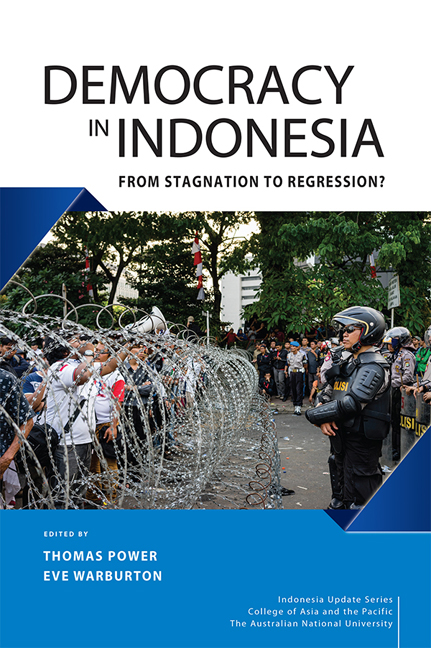Book contents
- Frontmatter
- Contents
- Tables and Figures
- Contributors
- Foreword
- Acknowledgments
- Glossary
- 1 The decline of Indonesian Democracy
- Part 1 Historic al and Comparative Perspectives
- Part 2 Polarisation and Populism
- Part 3 Popular Supp ort for Democracy
- Part 4 Democratic Institutions
- Part 5 Law, Security and Disorder
- Index
- Indonesia Update Series
11 - The media and democratic decline
Published online by Cambridge University Press: 24 November 2020
- Frontmatter
- Contents
- Tables and Figures
- Contributors
- Foreword
- Acknowledgments
- Glossary
- 1 The decline of Indonesian Democracy
- Part 1 Historic al and Comparative Perspectives
- Part 2 Polarisation and Populism
- Part 3 Popular Supp ort for Democracy
- Part 4 Democratic Institutions
- Part 5 Law, Security and Disorder
- Index
- Indonesia Update Series
Summary
A free and robust media is central to any democracy. Traditionally, the media's role is as a ‘fourth estate’: an institution that can comment on and objectively criticise other ‘estates’ such as the government, judiciary and religious organisations (Bulla 2008). There are, of course, problems with this definition and much to debate about the precise power journalists and editors should be given, but as a general rule in any functioning democracy the media plays a vital role in enhancing the transparency and accountability of powerful actors and institutions (ibid.).
Indonesia's transition from authoritarian rule to democracy in 1998 saw its media landscape become significantly more free than it had been under Suharto's authoritarian rule. Janet Steele (2012: 2) described this immediate post-reformasi period as one in which the media moved ‘from darkness into light’. Among the political and economic chaos that accompanied the collapse of the New Order, media owners, press freedom activists and ordinary Indonesians began to produce and enjoy a wider diversity of news and views. The lasting exceptions in this story of transformation are the provinces of Papua and West Papua, where, due to a simmering separatist movement, the local media operates under a subnational authoritarian regime and international journalists face stringent regulatory restrictions (Tapsell 2015).
The Papua exception aside, many scholars and observers frame Indonesia's current media landscape by comparing it to the previous New Order period (Kitley 2008; Steele 2010). If seen through this prism, the Indonesian media operates in a largely free environment. News outlets publish stories of government corruption, and journalists comment on and criticise government policies. The media can now report on certain topics that were ‘taboo’ under Suharto, including race and religion. The emergence of social media as a prominent form of communication in Indonesia has undoubtedly played a significant role in allowing greater freedom of expression for individuals to air their grievances; in some cases, social media activism has helped bring about important changes to laws and issues that affect civil society (Fortuna Anwar 2015: 28). Thus, when compared with the New Order, Indonesia's contemporary media landscape looks vibrant and free.
Yet this chapter will show how the declining quality of Indonesia's media has contributed to a broader decline in the quality of democracy in the country.
- Type
- Chapter
- Information
- Democracy in IndonesiaFrom Stagnation to Regression?, pp. 210 - 227Publisher: ISEAS–Yusof Ishak InstitutePrint publication year: 2020

